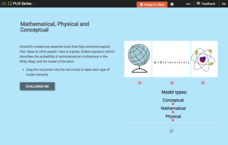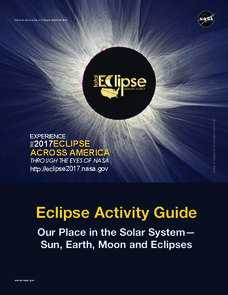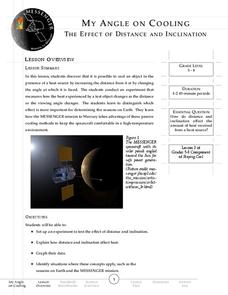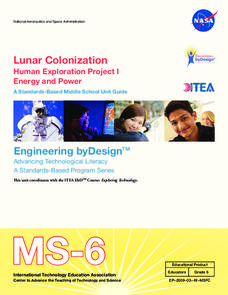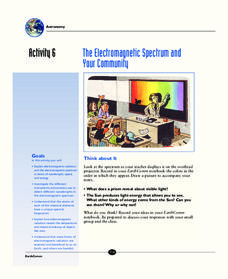CK-12 Foundation
Seasons: Shadow Lengths
Before iPhones and calendars, how did humans determine the seasons of the year? Middle school scientists discover how to use shadows to determine the time of year in an enlightening interactive. Pupils manipulate the sun and examine the...
CK-12 Foundation
Modeling: Mathematical, Physical and Conceptual
Scientific models help explain ideas and concepts to non-experts. The online activity covers conceptual, mathematical, and physical models. Through four multiple-choice questions and three discussion questions, scholars gain a deeper...
NASA
Eclipse Activity Guide
Ever made solar s'mores? Or recreated the solar system using peanuts? Astronomers young and old investigate all things solar using a variety of activities. Explore how the sun works, types of light it emits, and methods of charting the...
CK-12 Foundation
Scientific Models: Mathematical, Physical and Conceptual
This is one super model interactive! Middle and high school science scholars examine scientific models through a simple resource. Guided, hands-on practice allows them to classify conceptual, mathematical, and physical models. Other...
Columbus City Schools
Experiencing Eclipses
Don't be caught in the dark! Young scientists investigate the causes of both solar and lunar eclipses using an interactive to help them understand the development of an eclipse over time. They then research facts and characteristics of...
McGraw Hill
Eclipse Interactive
Give your classes a visual model of a rare phenomenon. Learners use an interactive activity to explore the connection of location, tilt, and size to the occurrence of an eclipse. Pupils consider both solar and lunar eclipses throughout...
McGraw Hill
Lunar Phases Interactive
View the moon changes from space while simultaneously experiencing the changes on Earth. A creative lesson allows pupils to view the big picture as they watch the orbit of the moon through a calendar period. At the same time, they see...
Chicago Botanic Garden
Seasons of a Plant
The third in a series of six lessons is an engaging three-part activity defines that discusses phenology, focusing on the cyclic seasons of plants. Pupils then observe phenology outside before determining how climate change can...
University of Colorado
Phases of Charon
Pluto, although no longer considered a planet, has five moons. Pluto's moon, Charon, is the focus of a resource that describes how the moon is viewed from the surface of Pluto. Photos help individuals see how Charon would look at...
SciShow Kids
Create Constellation Flash Cards #sciencegoals
Get the inside scoop on constellations from Jessi and Sam the Bat in a captivating video that also supports study skills using flashcards.
SciShow Kids
Make a Moon Puzzle! #sciencegoals
Craft a moon puzzle with the help of an energetic and captivating video. Listen and watch while the host demonstrates the step-by-step process and includes a plethora of useful information about the moon.
Messenger Education
My Angle on Cooling—Effect of Distance and Inclination
When exploring Mars, spacecrafts are exposed to 5-11 times more sunlight than when near Earth. Groups of pupils complete a hands-on activity to explore how distance and angle of the sun affect temperature. Through discussions, they then...
S2tem Centers SC
Seasons
Winter, spring, summer, and fall—take the learning of the seasons beyond the elementary level to the middle school classroom. Curious learners begin by watching videos about the seasons and the rotation of planet Earth. Then, they...
Journey Through the Universe
Our Solar System
Take your class on a journey through our solar system. Learners explore each planet, from Mercury to Pluto, and discuss various features that differentiate one from another. They complete activities related to the topics and discuss the...
Journey Through the Universe
Going through a Phase
Ignore the full moon, it's just a phase. Young scholars observe and record the moon during a full cycle before learning to predict future phases. Then the instructor leads a discussion on the other solar system objects that also go...
NASA
Lunar Colonization
A five-lesson unit challenges teams to design a complex to allow people to colonize the Moon. The teams first work in order to understand the challenge before becoming experts. Expert teams learn about different aspects needed to survive...
NASA
Moon Phases and Eclipses
Starry-eyed astronomers draw different views of the Moon in order to introduce its phases. Then they experiment with a ball and a lamp to recreate the phases. A demonstration ensures every pupil understands the process, and the...
NASA
Space-Based Astronomy on the Internet
Young scientists compile everything they have learned into a report in the fifth and final lesson in a unit on the visible light spectrum. Access to photos from observatories, telescopes, and satellites allows learners to compare and...
It's About Time
The History and Scale of the Solar System
Take scientists beyond our earthly reach and into the solar system. Pupils create a model of the solar system and discuss strengths and weaknesses of their model. They calculate distances in light years, discuss the nebular theory, and...
It's About Time
Our Community's Place Among the Stars
But isn't the Milky Way a candy bar? Lead a detailed discussion on the complex topic of our solar system and the Milky Way Galaxy as the class explores stellar evolution, structure, and investigates the relationship between luminosity...
It's About Time
The Electromagnetic Spectrum and Your Community
Do you have blossoming astronomers who seek to understand the electromagnetic spectrum? Assist them with exploring electromagnetic radiation and the electromagnetic spectrum as the class conducts various activities to demonstrate...
It's About Time
The Sun and Its Effects on Your Community
Why is the sun round? Examine this question, and others, with your pupils while teaching them how to live in a more earth-friendly environment. Pupils explore Sun composition and discuss how solar wind, sunspots, and solar energy affects...
It's About Time
Impact Events and the Earth System
What would happen to Earth if an asteroid struck it? Assist young scientists as they explore the mechanics of an impact event and effects caused by it; calculate the energy released once an asteroid strikes Earth's surface; and compare...
It's About Time
Orbits and Effects
What does your world revolve around? Challenge the class as they learn about orbits and the effects of them on our modern world. Young astronomers begin by measuring ellipses and calculating the eccentricity of Earth's orbit. Then, they...



